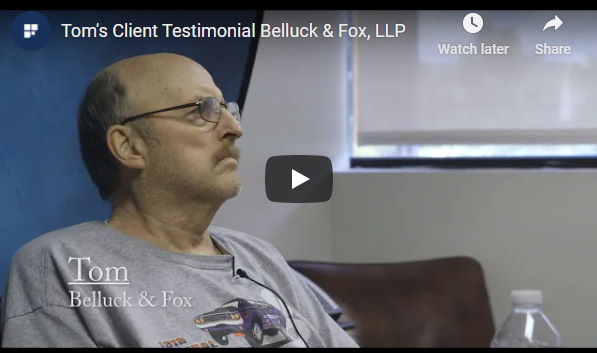Case Story and Client Testimonial of Thomas McCormick

Thomas McCormick grew up in a close-knit Catholic family that was “always together.” His parents were hard workers who struggled to make ends meet. Tom spent ample time helping his younger brothers and sisters and did as much as he could to help around the house. At 16, he started working as a dishwasher and busboy at various restaurants and country clubs. His father, always repeating the mantra “fix it, don’t throw it out,” taught him how to repair lawnmowers that they’d find on the side of the road.
Tom graduated from high school and tried college on for size, but after a year decided that it wasn’t for him. He instead got a job as a “gunslinger,” repairing and maintaining the heating systems in Albany’s many large commercial buildings. Tom worked with another mechanic to clean and repair commercial equipment. “We’d get very dirty and were involved with asbestos pretty much every day,” Tom explained in his deposition. Amongst other things, Tom worked on water circulators, steam traps, boilers, pumps, and water heaters.
Tom then got a job as a boiler room helper at Albany Medical Center, where he was tasked with fixing and maintaining Cleaver Brooks boilers and completing various projects concerning valves and steam traps around the hospital. He would shut the boilers down, clean out the boilers and the burners, open up the handholes from the water and fire side of the boiler, and would even crawl inside and clean out the boiler.
Following his job at Albany Med, Tom was hired as a serviceman. He replaced a lot of boilers and did a lot of household plumbing work. “I would be white at the end of the day except for where I wore my hat,” Tom said of the asbestos that he encountered while working on the boilers. He estimated repairing thousands of boilers in this capacity.
In 1983, Tom began working for a company called Main-Care Heating and Oil, where he worked as a serviceman for heating. From 1983-1993, he repaired an estimated 1000+ boilers.
Diagnosis
Prior to the summer of 2019, Tom’s health was good. “I was very active. I had my own business until 2013” he explained. Tom had never experienced any breathing problems or been diagnosed with any form of cancer. He enjoyed boating, doing home repairs, snow blowing, and gardening, amongst other things. “I was quite the handyman,” he said, “I was Mr. Fix It Man.”
In the spring of 2019, however, Tom started to slow down. His wife noticed that “he was not as energetic or gregarious as he used to be.” By April and May, Tom was experiencing so much pain that he felt like “[he] had an elephant sitting on his chest.” He was initially told that he had water on his right lung and had three liters of liquid removed. When the pleural tissue was biopsied, however, Tom learned that he had mesothelioma. Learning of his diagnosis “made [him] feel” awful. Because of the COVID-19 crisis, Tom was unable to digest the news with his family present and had to stay in the hospital alone. When he finally was given clearance to leave the hospital, Tom told his elderly parents about the mesothelioma diagnosis. “They were pretty disheartened,” Tom explained in his deposition, “My mother was crying, my father was crying. They were very upset because they didn’t want to lose their oldest child before they were to die. It was a pretty sad affair.”
Tom then had a pleurectomy performed by a thoracic surgeon in New York City who removed eight pounds of cancerous cells from Tom’s right lung. “I was hurting like hell, but I felt lucky that I was alive,” Tom, ever the optimist, explained, “I could’ve died on the table too, you never know.” He felt thankful that in the new stage of quarantine, his daughter and wife were able to visit him after his painful surgery.
Following four rounds of chemotherapy that rid his lungs of the remaining cancer cells but left him with serious side effects, Tom found that he couldn’t stand for any length of time nor could he do work around the house. “My wife has to do everything for me,” Tom said. The narcotics that he was given for the chemotherapy also rendered him unable to drive. “I love driving, driving’s my favorite thing to do. I was always the driver,” he continued wistfully, “By not being able to drive, it takes away some of my freedom.”
“I love my children—I love them to death,” Tom said in his deposition, tearing up, “We would do everything together—camping, boating, out in the car, in the house, growing gardens, doing scouting activity with my son. I can’t do that anymore—I’m sick and I don’t like it.” He especially laments the fact that he cannot see his two-year-old granddaughter. “She kind of knows her Papa, but we haven’t seen her in three months. But she’ll get to know me,” Tom continued with hope, “She’s just a cool little kid.”
Currently, Tom is getting immunotherapy with Keytruda to try to keep the mesothelioma under control.




